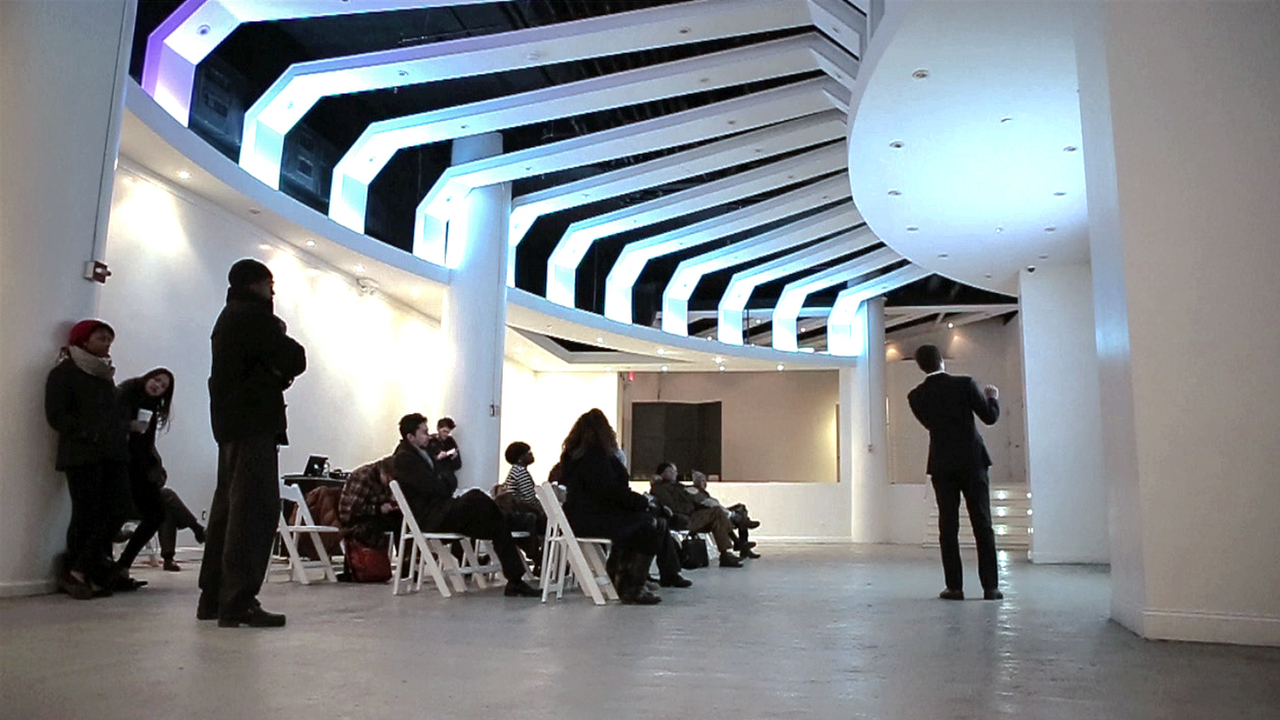Steps from the New York Stock Exchange, in a storefront plastered with signs, lies a considerably smaller financial institution. This is the New York City Bitcoin Center, a startup company devoted to educating the masses about the ballyhooed cryptocurrency and making some cash while doing it.

The center, which opened its doors on January 1st, offers consultations to businesses and individuals about how to properly use and store bitcoin. Five hundred dollars gets you a three-hour hands-on course, and a shorter, introductory class runs $50.
“We’re offering consultation services for businesses, individuals–anyone who wants to come in,” says Deputy Director Austin Alexander, an enthusiastic 20-something, in the rapid-fire patter of a born salesman. “We’re going to cover everything, from the top to the bottom, inside, outside, left, and right, of the bitcoin protocol, and how to implement it into your life.”
Wednesday night, a free seminar at the center — “Bitcoin 101” — was equal parts college classroom, sales pitch, and evangelical sermon. Fifteen to twenty people sat in folding chairs and listened, some taking notes, as Alexander held forth in front of a projector that streamed real-time bitcoin transactions from the website Blockchain.info.
To hear Alexander tell it, bitcoin is nothing short of world-changing. At the seminar, he spoke of families in South Sudan with no access to the global financial market, of the bitcoin protocol as human history’s crowning achievement in cryptography, and the bitcoin network as the world’s most powerful supercomputer. He spoke of “insane value-adds to humanity,” and of being so excited about bitcoin he can barely sleep at night. One key metaphor involved a foreign planet and “gold-covered mountains with rainbows coming out of them.”
 Intro to Bitcoin + Know Your Wallet Facebook Event
Intro to Bitcoin + Know Your Wallet Facebook Event
In an interview with ANIMAL after the speech, Alexander continued to preach Bitcoin’s virtues, but copped to the idea that it may not be everyone’s wisest investment. Over the first two weeks of December, for example, the currency lost half of its value, plunging from over $1,200 per bitcoin to just under $600.
“Bitcoin is five years old. It’s an infant. And just like the emotional stability of an infant is very volatile, the value of bitcoin is very volatile,” he said.

“I’m not a financial advisor,” he added. “I don’t know what Joe and Jane America should do. They’re probably uncertain about what they should do, and there’s a lot going on in their lives that I don’t know about. I would say the best person to decide what Joe and Jane America should do is them. ”
One Bitcoin is worth about $930 at the time of this writing.
Alexander first heard about bitcoin while working at the Mercatus Center, a Koch Brothers-funded conservative think tank, and the spirit of economic deregulation put forth by that institute seems to inform his view of the currency.
“I talk to very smart people all day, every day, who have such huge, forward thinking visions about what bitcoin can do, and where it can take the world,” he says, “but 90 percent of their mental real estate is wasted by thinking, ‘Oh, am I even allowed to do this?'”
At one point in our conversation, Alexander brought up the state government before cutting himself off, saying “Well, let’s not talk about that.”
He may have been referring to the New York Department of Financial Service’s announcement in November that it would launch an inquiry into regulating digital currencies, citing “evidence that the cloak of anonymity provided by virtual currencies has helped support dangerous criminal activity, such as drug smuggling, money laundering, gun running, and child pornography.”
Nick Spanos, a former commercial fisherman who co-founded the Bitcoin Center, offered a pragmatic view of its business model, but admitted lofty ambitions. Though the Center is focused on its $500-a-session seminars now, he hopes it will eventually become a full-fledged exchange, hosting transactions of all kinds (and presumably taking a cut off the top–Spanos says he hopes such transactions will be profitable for the center). “You figure out a better rig as you go along. That’s the business model,” he said, comparing the cryptocurrency game to his old profession.

The Bitcoin Center’s cavernous space on Broad Street was mostly empty Wednesday night. Its white walls are bare of any decoration, and refreshments consisted of orange juice and two bottles of Svedka on a table near the back of the room. Its online presence is small as well–it basically amounts to a Facebook page — though Spanos says a more developed website is in the works.
As ragtag as the center may be, it has friends in high places: Steve Stockman, a Republican congressman and senatorial candidate from Texas who’s said he’ll accept bitcoin campaign donations (also known as the man who killed Doge), celebrated New Year’s Eve there, and appears in a YouTube video with Spanos, in which the two man walk around the financial district, speculating about the future of bitcoin. Stockman’s past endeavors include calling the Waco deaths a Clinton administration plot and publishing a bumper sticker that says “If babies had guns, they wouldn’t be aborted.”
“Digital currency’s more about freedom,” Stockman says in the video. “Because all the time people are trying to get in your pocket, trying to do different things to control you. Freedom to choose what you do with your money, and freedom to keep your money without people influencing it by printing money or through regulation.”
In the future of economics as envisioned by Alexander and Spanos, those regulations won’t exist — or they’ll be much smaller — and the Bitcoin Center will be in a position to make lots and lots of money. Eventually Spanos would like to be running the New York Stock Exchange of Bitcoin.
“Our main goal is to have a live exchange,” he says, “just like next door.”
(Top video: Aymann Ismail/ANIMALNewYork)


